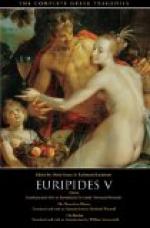But another problem interests Euripides even more than this. What kind of man was it—above all, what kind of woman can it have been, who would do this deed of mother-murder, not in sudden fury but deliberately, as an act of “justice,” after many years? A “sympathetic” hero and heroine are out of the question; and Euripides does not deal in stage villains. He seeks real people. And few attentive readers of this play can doubt that he has found them.
The son is an exile, bred in the desperate hopes and wild schemes of exile; he is a prince without a kingdom, always dreaming of his wrongs and his restoration; and driven by the old savage doctrine, which an oracle has confirmed, of the duty and manliness of revenge. He is, as was shown by his later history, a man subject to overpowering impulses and to fits of will-less brooding. Lastly, he is very young, and is swept away by his sister’s intenser nature.
That sister is the central figure of the tragedy. A woman shattered in childhood by the shock of an experience too terrible for a girl to bear; a poisoned and a haunted woman, eating her heart in ceaseless broodings of hate and love, alike unsatisfied—hate against her mother and stepfather, love for her dead father and her brother in exile; a woman who has known luxury and state, and cares much for them; who is intolerant of poverty, and who feels her youth passing away. And meantime there is her name, on which all legend, if I am not mistaken, insists; she is A-lektra, “the Unmated.”
There is, perhaps, no woman’s character in the range of Greek tragedy so profoundly studied. Not Aeschylus’ Clytemnestra, not Phaedra nor Medea. One’s thoughts can only wander towards two great heroines of “lost” plays, Althaea in the Meleager, and Stheneboea in the Bellerophon.
G.M.
[Footnote 1: Most of this introduction is reprinted, by the kind permission of the Editors, from an article in the Independent Review vol. i. No. 4.]
ELECTRA
CHARACTERS IN THE PLAY
CLYTEMNESTRA, Queen of Argos and Mycenae; widow of Agamemnon.
ELECTRA, daughter of Agamemnon and Clytemnestra.
ORESTES, son of Agamemnon and Clytemnestra, now in banishment.
A PEASANT, husband of Electra.
AN OLD MAN, formerly servant to Agamemnon.
PYLADES, son of Strophios, King of Phocis; friend to Orestes.
AEGISTHUS, usurping King of Argos and Mycenae,
now husband of
Clytemnestra.
The Heroes CASTOR and POLYDEUCES.
CHORUS of Argive Women, with their LEADER.
FOLLOWERS of ORESTES; HANDMAIDS of CLYTEMNESTRA.
The Scene is laid in the mountains of Argos. The play was first produced between the years 414 and 412 B.C.
ELECTRA




